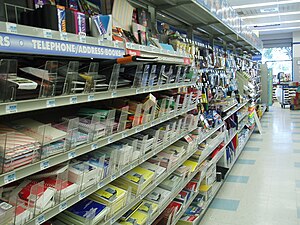Portal:Business
The Business and Economics Portal Business is the practice of making one's living or making money by producing or buying and selling products (such as goods and services). It is also "any activity or enterprise entered into for profit." A business entity is not necessarily separate from the owner and the creditors can hold the owner liable for debts the business has acquired. The taxation system for businesses is different from that of the corporates. A business structure does not allow for corporate tax rates. The proprietor is personally taxed on all income from the business. A distinction is made in law and public offices between the term business and a company such as a corporation or cooperative. Colloquially, the terms are used interchangeably. (Full article...) Economics (/ˌɛkəˈnɒmɪks, ˌiːkə-/) is a social science that studies the production, distribution, and consumption of goods and services. Economics focuses on the behaviour and interactions of economic agents and how economies work. Microeconomics analyses what is viewed as basic elements within economies, including individual agents and markets, their interactions, and the outcomes of interactions. Individual agents may include, for example, households, firms, buyers, and sellers. Macroeconomics analyses economies as systems where production, distribution, consumption, savings, and investment expenditure interact, and factors affecting it: factors of production, such as labour, capital, land, and enterprise, inflation, economic growth, and public policies that have impact on these elements. It also seeks to analyse and describe the global economy. (Full article...) Selected articleThe economy of the Han dynasty (206 BC – 220 AD) of ancient China experienced upward and downward movements in its economic cycle, periods of economic prosperity and decline. It is normally divided into three periods: Western Han (206 BC – 9 AD), the Xin dynasty (9–23 AD), and Eastern Han (25–220 AD). The Xin regime, established by the former regent Wang Mang, formed a brief interregnum between lengthy periods of Han rule. Following the fall of Wang Mang, the Han capital was moved eastward from Chang'an to Luoyang. In consequence, historians have named the succeeding eras Western Han and Eastern Han respectively. The Han economy was defined by significant population growth, increasing urbanization, unprecedented growth of industry and trade, and government experimentation with nationalization. Another large component of the government is that it was run by influential families who had the most money. In this era, the levels of minting and circulation of coin currency grew significantly, forming the foundation of a stable monetary system. The Silk Road facilitated the establishment of trade and tributary exchanges with foreign countries across Eurasia, many of which were previously unknown to the people of ancient China. The imperial capitals of both Western Han (Chang'an) and Eastern Han (Luoyang) were among the largest cities in the world at the time, in both population and area. Here, government workshops manufactured furnishings for the palaces of the emperor and produced goods for the common people. The government oversaw the construction of roads and bridges, which facilitated official government business and encouraged commercial growth. Under Han rule, industrialists, wholesalers, and merchants—from minor shopkeepers to wealthy businessmen—could engage in a wide range of enterprises and trade in the domestic, public, and even military spheres. Selected image
Selected economy
Iran is a mixed economy with a large public sector. Some 60% of Iran's economy is centrally planned.[needs update] Iran's economy is characterized by its hydrocarbon, agricultural, and service sectors, in addition to manufacturing and financial services, with over 40 industries directly involved in the Tehran Stock Exchange. With 10% of the world's proven oil reserves and 15% of its gas reserves, Iran is considered an "energy superpower". (Full article...)
Selected quote"There is one sure mark of the coming partner, the future millionnarie; his revenues always exceed his expenditures. He begins to save early, almost as soon as he begins to earn. No matter how little it may be possible to save, save that little. Invest it securely, not necessarily in bonds, but in anything which you have good reason to believe will be profitable, but no gambling with it, remember. A rare chance will soon present itself for investment. The little you have saved will prove the basis for an amount of credit utterly surprising to you. Capitalists trust the saving man. For every hundred dollars you can produce as the result of hard-won savings, Midas, in search of a partner, will lend or credit a thousand; for every thousand, fifty thousand. It is not capital that your seniors require, it is the man who has proved that he has the business habits which create capital, and to create it in the best of all possible ways, as far as self-discipline is concerned, is, by adjusting his habits to his means. Gentlemen, it is the first hundred dollars saved which tells. Begin at once to lay up something. The bee predominates in the future millionnarie."
TopicsRelated WikiProjectsDid you know (auto-generated) -
On this day in business history
General imagesThe following are images from various business-related articles on Wikipedia.
More did you know
Business news
SubcategoriesRelated portals
Things you can doUrgent and important articles are bold
WikimediaThe following Wikimedia Foundation sister projects provide more on this subject:
SourcesDiscover Wikipedia using portals |








































